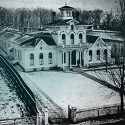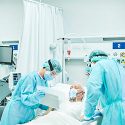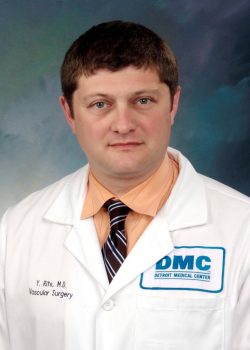Vascular Surgery Fellowship
Message from the Program Director
My commitment to training Vascular Surgery Fellows at Wayne State University School of Medicine began in 2009. I was promoted to Program Director in August 2019 after serving as Associate Program Director for 8 years. I continue to embrace the philosophy and mission of previous program directors, Drs. Ramon Berguer, Charles Shanley, O.W. Brown, and William Oppat, to train high quality applicants to be modern vascular surgeons with sound clinical knowledge and vascular techniques required to deliver top notch vascular care.
Our fellowship program is based in the heart of Detroit, within multiple participating healthcare systems. Training is carried out by diverse faculty in both urban and suburban settings, to provide varied experience in a dynamic healthcare environment. All faculty members are very enthusiastic and deeply involved in education and training future leaders in vascular surgery. All academic sites have dedicated endovascular suites and ICAVL vascular labs designed for providing top notch patient care as well as and training for the applicants. Services are supported by Advance Care Providers and Residents allowing for teaching, training, and research opportunities.
The Division of Vascular Surgery within the Wayne State School of Medicine has been recognized for its collegiality, leadership, innovation, and professionalism within the community it serves, as well as on a national and international level.
The WSU/DMC Vascular Surgery Fellowship is an Accreditation Council of Graduate Medical Education (ACGME) traditional (5+2) accredited two-year training program. It was established in 1990 by internationally recognized vascular surgeon, Ramon Berguer, M.D., although focused training in vascular surgery had been practiced for many years even prior to formal accreditation. In order to further enhance training in this rapidly evolving field and to remain competitive to applicants, our ultimate goal is to develop and implement a “0+5” completely integrated vascular residency in conjunction with the Division of General Surgery.
Prospective Fellows
Curriculum
The vascular specialists of DMC / Wayne State University School of Medicine evaluate and treat the entire gamut of arterial, lymphatic and venous disease in the body outside of the heart.
Employing physical diagnostic techniques, noninvasive vascular testing, computed axial tomography (CT Scan) and when necessary arteriography we evaluate patients with diseases of the arterial and venous systems. Once a diagnosis is achieved, vascular specialists initiate conservative medical management, when indicated, and in situations that are not amenable to medical therapy, we perform minimally invasive endovascular techniques, open surgical techniques and “hybrid procedures” which include a combination of endovascular and open procedures to treat vascular abnormalities. A “state of the art” newly completed hybrid procedure room at Harper University Hospital is used on a daily basis to perform vascular procedures.
We treat extracranial cerebrovascular disorders including carotid artery stenoses and aneurysms, subclavian, vertebral and aortic arch abnormalities for aneurysms and occlusive disease. We treat aneurysms of the thoracic aorta, abdominal aorta, iliac arteries and peripheral arteries. We treat patients with claudication, rest pain and tissue loss due to arterial occlusive disease. In addition, individuals with all forms of vasculitis are seen by our team and working in conjunction with other specialists a comprehensive treatment plan is established.
Employing both endovascular and open treatments, patients with mesenteric and renal artery disease, including occlusive as well as aneurysmal disease receive state-of-the-art treatment. Branch aneurysms of the renal artery have been successfully treated with bench repair and auto-transplantation by our team. The results of these procedures have been presented at national meetings.
Venous conditions including deep vein thrombosis, acute, subacute and chronic thromboses are treated with medical therapy as well as endovenous therapy for occlusive disease as well as venous insufficiency. We also treat the patient’s with varicose vein disease with minimally invasive endovenous ablation, microincision avulsion phlebectomy and sclerotherapy.
The vascular specialists treat patients with chronic lymphedema and have developed new, state-of-the-art techniques for reducing massive lymphedema in patients with chronically severe disabling disease.
Lastly, the Vascular Specialists of DMC/WSUSOM have developed and maintain one of the only hospital based Dialysis Access Centers in the region and have achieved nationally recognized results in establishing and maintaining dialysis access fistulas and grafts.
- Aortic Surgery for occlusive and aneurysmal diseases
- Complex Aortic Reconstructions
- Limb Salvage & Peripheral Artery Disease (PAD)
- Peripheral Aneurysms (Femoral, Popliteal, Subclavian, Carotid)
- Carotid Artery and Great Vessel Disease
- Diabetic foot wound care
- Dialysis access
- Lymphedema
- Thoracic Outlet Syndrome
- Inflammatory Vasculitis
- Venous Disease & Varicose Veins
- Venous insufficiency
- Deep Vein Thrombosis
- Percutaneous Balloon Venoplasty and Stenting
- Wound Care
HARPER UNIVERSITY HOSPITAL/DMC (Sponsoring Institution)
FACULTY:
Maciej (Matt) R. Uzieblo, MD, RVT, RPVI
Steven Rimar, MD
Paul Bove, MD
Scott M. Silver, MD, RPVI
Yevgeniy (Eugene) Rits, MD, RPVI
JOHN D. DINGELL VA MEDICAL CENTER
FACULTY:
Daniel J. Reddy, MD, FACS
SINAI GRACE HOSPITAL
CHIEF:
Martin Tuma, MD
ASCENSION ST. JOHN HOSPITAL
CHIEF:
Kevin Nolan, MD
SITE DIRECTOR:
Tamer Boules, MD
FACULTY:
Boyd Richards, DO
Pritham Reddy, MD, FACS, RVT
Richard D Fessler II, MD
William Oppat, MD, FACS
ST. JOSEPH MERCY ANN ARBOR
CHIEF:
Walter M Whitehouse, MD, FACS
SITE DIRECTOR:
Brian G. Halloran, MD, FACS
FACULTY:
Abdulhameed Aziz, MD
Chinmaya S. Shelgikar, MD
Michael J. Heidenreich, MD
WSU/SOM
FACULTY:
Mark A. Mattos, M.D.
Length of Program
Two Years RRC approved
Eligibility Requirements
- Successful completion of the USMLE Steps 1-3
- Graduate of an Accredited U.S. or Canadian Medical School or valid ECFMG certificate.
- Successfully completed an ACGME or AOA Accredited
- General Surgery Residency Program
Application Deadlines
February 1st
Application Requirements (https://www.aamc.org/services/eras/)
- Curriculum Vitae
- Personal Statement
- Registration with the National Residency Matching Program
- Three Letters of Recommendation, including one from the Chief of General Surgery from their institution.
Match Date
National Resident Matching Program (NRMP)

Goal of Fellowship
Our primary objective is to train future leaders in vascular surgery; we are dedicated to developing clinically talented academic surgeons. All Fellows are expected to be actively involved in clinical research projects with a faculty mentor yielding at least 1-2 peer-reviewed publications in each year of training. We strongly believe that the high volume of advanced vascular services provided by our faculty in the setting of the rich diversity of Southeastern Michigan fuels our active and productive clinical research program.









